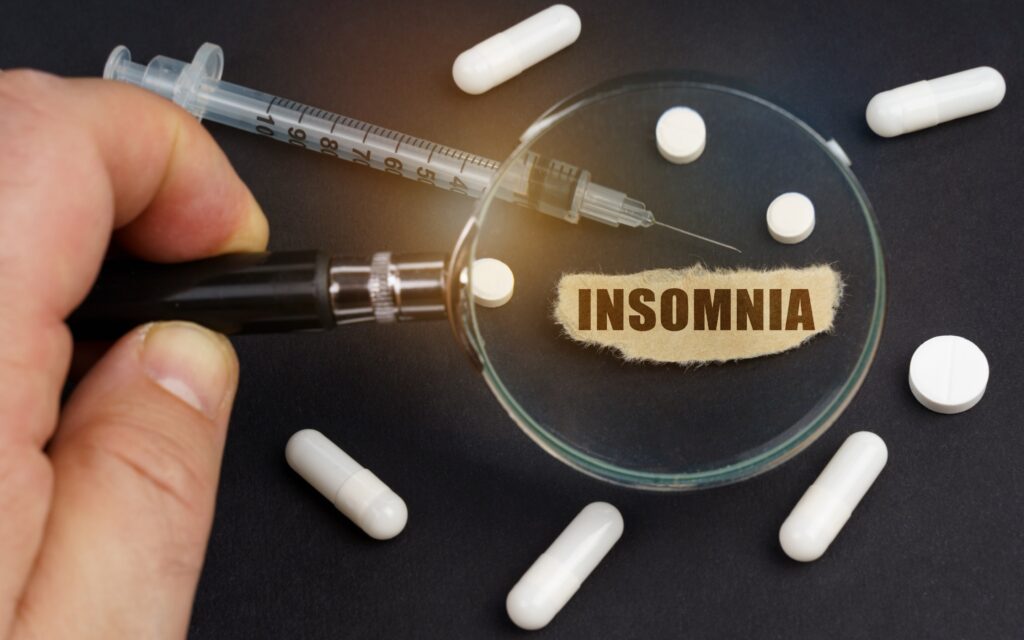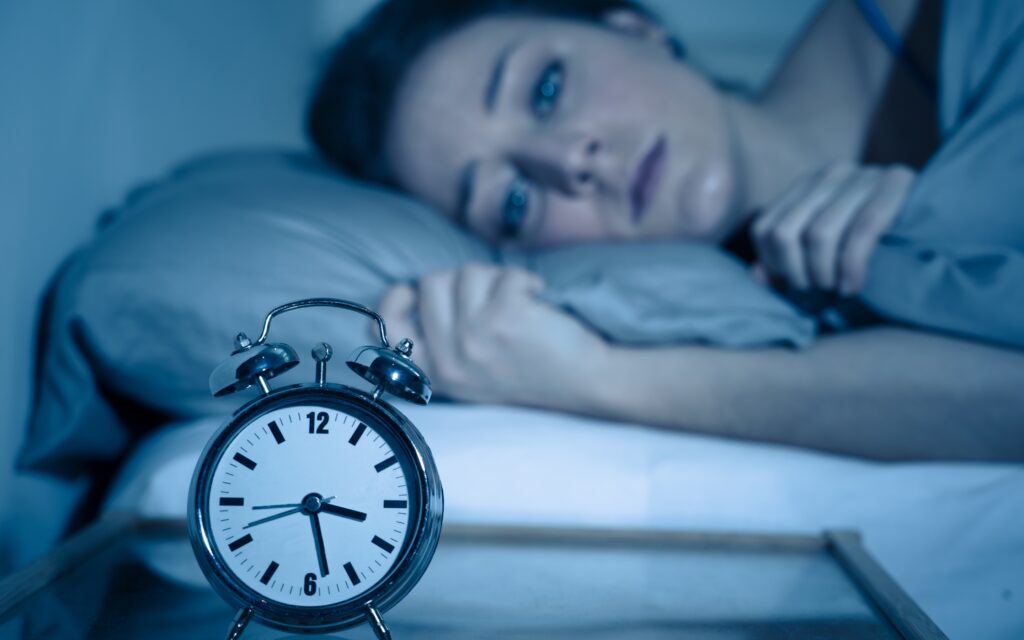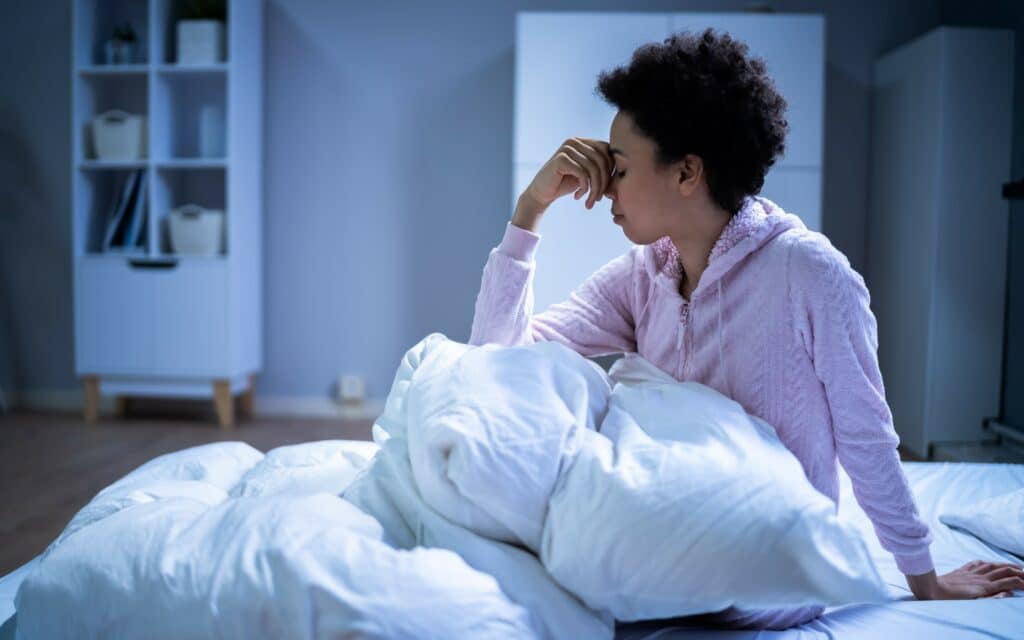Medications that cause insomnia can be a serious problem for patients from all walks of life. The last thing you want is to choose between a crucial medicine, like Metoprolol, or Lipitor, and a good night’s rest. Today, we’re going to be exploring 10 medications known for interfering with your much needed slumber.
There are many reasons why medications that affect sleep cause the adverse effects they do. Sometimes, a certain medication will have an impact on the release of certain hormones in your body, which stimulate your mind and keep you awake. Other medications can affect your circadian rhythm directly or alter your muscle tone, which can prompt things like sleepwalking.
Whenever you’re starting a new medication, your doctor will consider both the potential side effects of the drug, and the benefits, to decide what the best treatment path might be.
However, if you know you already suffer from sleep problems, you can learn what medications cause insomnia in an attempt to avoid these drugs.
Keep in mind that different medications affect people in different ways. Just because some people experience insomnia, doesn’t mean the same will be true for you.
Let’s take a closer look at some of the medications that affect sleep.
1. Sudafed (Epinephrine)
If you’ve ever asked, “Does Sudafed keep you awake?” you’re not alone. Sudafed is the brand-name for a nasal decongestant, which contains pseudoephedrine.
When you’re congested, swollen blood vessels can build up in your sinuses, causing problems with your breathing, and an overall feeling of stuffiness. Congestion might happen during infection, allergies, or a cold.
Sudafed works by shrinking the vessels of the respiratory mucosa, which helps to open your airways, and ensure you can breath more easily. While being able to breathe properly is essential to a good night’s sleep, the contents of Sudafed can cause issues with insomnia.
Pseudoephedrine, and other similar medications containing epinephrine, have a stimulatory effect on the body. They stimulate the nervous system, increase norepinephrine levels, and increase your blood pressure – all factors which will keep you awake.
Sudafed stimulates sympathetic part of the nervous system – a system which also influences the regulation of the sleep-wake cycle. By giving you a sense of energy, Sudafed can mess with your overall circadian rhythm.
If you do encounter problems with Sudafed keeping you awake at night, your doctor may advice using a different version of the medication to reduce the problem.
Some forms of Sudafed are specifically designed to help keep you awake when you’re experiencing issues with congestion from colds and flu. As colds can cause you to feel fatigued.
You can learn more about how epinephrine effects your sleep pattern here.

2. Lisinopril
How does Lisinopril cause insomnia?
Lisinopril is a medication designed for reducing blood pressure. This drug belongs to a group of medications known as Angiotensin-Converting Enzyme inhibitors (ACE) inhibitors. These drugs help to relax the blood vessels and prevent the body from producing angiotensin II, a hormone responsible for causing blood vessels to narrow and blood pressure to rise.
Initially, taking Lisinopril can cause dizziness due to the sudden drop in blood pressure. After you take this medication for a while, you may notice other side-effects begin to develop, such as headaches, anxiety, drowsiness, and insomnia.
Lisinopril and other ACE inhibitors cause insomnia by increasing the levels of a peptide in the body known as “bradykinin”. This substance is thought to be the cause of the dry cough that up to a third of all patients taking ACE inhibitors tend to develop. This cough is generally enough to keep anyone awake, but ACE inhibitors can cause other problems too, like cramps or joint pain.
In some cases, if you’re struggling with sleep when using Lisinopril, your doctor may advice switching to a calcium channel blocker instead. Alternatively, you might need to consider changing the dosage of your medication, to see whether a reduced dose can limit your side effects or symptoms.
Learn about ACE Inhibitors and sleep here.
3. Lipitor
If you’ve been prescribed statins to deal with high cholesterol levels, then you may be wondering, “Does Lipitor cause insomnia?” Statins are a common solution to high cholesterol, often prescribed when standard lifestyle changes aren’t enough to address the issue.
Unfortunately, Lipitor and other statins can also cause a range of side effects. The most common side effect of statins is muscle pain. This pain can influence your sleep by causing significant discomfort, which makes it difficult to rest. Some studies even indicate that statins can inhibit muscle growth, by interfering with the production of muscle satellite cells.
Researchers also believe certain kinds of statins, including Lipitor, might be more likely to cause nightmares and insomnia. They easily penetrate the braincell membranes and pass the blood-brain barrier, which normally keep toxins out of the brain.
Most medical professionals will advise making lifestyle changes and updating your diet before you begin taking statins. Many experts believe that lifestyle changes can sometimes be just as effective as statins, when it comes to reducing cholesterol levels long-term.
If you are considered to be at high risk of heart disease because of high cholesterol, your doctor might insist you need statins.
Click here to learn more about statins and insomnia.

4. Metoprolol
Beta-blockers are a kind of medication typically prescribed to treat high blood pressure (hypertension). However, these medications can also be effective at treating arrhythmias. The drugs work by slowing the heart rate and lowering blood pressure by blocking the hormone.
Metoprolol, otherwise known as Lopressor or Toprol, is a popular form of beta-blocker. However, there have been a number of reports about issues regarding Metoprolol and insomnia. Beta-blockers are frequently associated with sleep disturbances, including nightmares and night-time awakenings.
Metoprolol and sleep are linked because the beta-blocker inhibits the night-time secretion of a crucial hormone involved in regulating sleep and the circadian rhythm – melatonin. When your brain secretes melatonin, it tells your body to begin winding down for sleep. When this secretion is inhibited, your cortisol levels may remain high, causing alertness.
Beta-blockers can be an extremely important part of treatment for some serious issues of high blood pressure and heart failure, so it’s important for anyone taking these medications not to simply stop taking the drugs due to insomnia.
In some instances, your doctors may advise you to take a small dose of melatonin to help counteract the effects of beta-blockers like Metoprolol. In other instances, you may need to look into taking calcium channel blockers instead – as an alternative form of blood pressure medication.
Learn more about Metoprolol and insomnia here.
5. Lamotrigine
Otherwise known as “Lamictal”, Lamotrigine is a type of medication used for the treatment of epilepsy. It can also act as a potent mood stabilizer. So, how does Lamictal cause insomnia?
It is believed Lamotrigine inhibits certain neurotransmitters in the brain. Though experts say the exact mechanism of action isn’t fully understood, Lamictal has been proven to have a significant impact on epilepsy, and bipolar disorder. The substance can significantly reduce your risk of seizures, and is capable of reducing depressive states.
Investigations into Lamotrigine and insomnia have revealed a number of patients who experience significant problems with sleep following regular treatment with Lamictal. As with any medication with a direct effect on the brain, the risk of insomnia is there.
According to studies, around 7% of patients taking Lamotrigine will experience a sleep disturbance significant enough to require a change in medications. However, studies also indicate the likelihood of problems with Lamictal are usually dependent on the dosage of treatment you receive.
Because Lamotrigine is a very important medication for the treatment of a potentially life-threatening condition, it’s particularly important for anyone taking this medication to speak regularly with their doctor.
Side effects experienced when taking this medication can sometimes be reduced by lowering the dosage of the medication. Your doctor could also suggest another form of treatment if this medication turns out to be unsuitable for you.
The link between Lamictal and insomnia is still being investigated. For many patients, a careful consideration of the correct treatment method will be essential to minimizing side effects.
Learn more about Lamotrigine and insomnia here.

6. Prednisone
When it comes to medications that cause insomnia, Prednisone is one of the most common culprits. Perhaps somewhat unsurprisingly, any kind of steroid can prompt significant problems with your sleeping pattern. Prednisone and similar medications prompt alertness, and can boost adrenaline levels, making it difficult to rest.
Prednisone is typically prescribed to individuals who need help dealing with issues of inflammation. This substance work as a powerful immune system suppressor in cases where it is important to reduce the action of the immune system.
Unfortunately, Prednisone and insomnia are closely linked. Prednisone and similar steroids work by stimulating the adrenal glands, wreaking havoc on the systems which regulate sleep and wakefulness in the human body. The more adrenaline your body releases, the more awake you feel.
In some cases, the over-stimulation of the adrenal glands through regular use of steroids can also lead to issues of extreme fatigue, which stay with the patient throughout the day. Though you might assume that fatigue would help you to sleep faster, the reality is it usually has chronic negative effect on sleep quality.
In studies into the side effects of prednisone, scientists have found that up to 70% of patients taking prednisone will experience some instance of insomnia. However, not every patient will experience a degree of sleep problems severe enough to require a change in medication.
If you are wondering how to sleep while taking steroids, learn more about Prednisone insomnia here.
7. Adderall
Medications that affect sleep aren’t always the ones you’d expect. For instance, Adderall is intended to help focus the mind and improve the symptoms of people suffering from ADHD. However, many people struggle with figuring out how to fall asleep on Adderall.
Adderall is primarily used for the treatment of ADHD, or ADD, and it contains a combination of two substances – amphetamine and dextroamphetamine. By changing the balance of chemicals in the brain, Adderall can improve focus, and alertness. The substance is also extremely useful for the management of other disorders, like narcolepsy.
There are various reasons why Adderall can cause insomnia. According to studies, around 33% of people who take Adderall also suffer from sleep disturbances. This includes a reduction in REM sleep, as well as fatigue, and insomnia. Experts believe the sleep issues caused by Adderall have to do with the changed balance of essential chemicals in the brain.
By increasing focus, Adderall may also reduce the production of melatonin – the substance responsible for the management of your circadian rhythm. People who have ADD can already have issues with the delayed onset of melatonin production. This is why sometimes; melatonin and Adderall are given as a dual treatment.
Before taking melatonin with Adderall or stopping the use of Adderall due to insomnia side effects, make sure you speak to your doctor about your options.
If you are wondering: ”How to make Adderall wear off so I can sleep? ”, click here.

8. Finasteride
Finasteride is a special kind of medication given for the treatment of male hair loss. The substance can also be used for the treatment of prostate conditions. Finasteride works by blocking the 5 alpha-reductase enzymes, responsible for converting testosterone into the substance associated with hair loss, dihydrotestosterone.
Though commonly considered to be a safe medication, Finasteride can have side effects like any other medication. One of the most significant concerns for many patients is Finasteride insomnia, an inability to sleep caused by regular use of the medication.
As with many drugs, the answer to “Does Finasteride cause insomnia?” can depend on many factors. Sometimes, your age, and the amount of a medication you’re taking will have an impact on how likely that substance might be to influence your rest. The more of this medication you take, the more likely you are to struggle with your sleep.
A decrease in androgen levels caused by medications like Finasteride is one of the most common issues associated with sleep disorders in patients using this medication.
Notably, Finasteride has been associated with not just lower sleep efficiency, but a higher risk of other sleeping problems, such as obstructive sleep apnea.
While reducing your intake of Finasteride may be a suitable solution to eliminating the problems with insomnia, you will need to continue taking this medication, if you want to see positive results. It’s best to speak to your doctor, if you have issues with sleep on this medication.
Learn more about Finasteride insomnia here.
9. Antidepressants
Antidepressants come in a range of different forms. Some antidepressants are actually effective at treating some of the symptoms of insomnia and improving sleep. However, SSRIs, or selective serotonin-reuptake inhibitors, are frequently associated with insomnia and trouble sleeping.
SSRIs work by blocking the reuptake of the neurotransmitter serotonin in the brain, which can help to ease symptoms of depression. However, studies indicate there may also be a link between these kinds of antidepressants and insomnia.
According to various pieces of research, SSRIs are likely to cause a range of side-effects in certain people, including agitation, impulsivity, and insomnia.
The problems linking antidepressants and insomnia cause significant issues when it comes to finding the right treatment for mood disorders. Treating an underlying depression can be an important part of getting rid of long-term issues with insomnia. However, the side-effects can worsen the symptoms and make life miserable for some patients, if they’re still unable to sleep.
If you’re struggling with insomnia when taking an antidepressant, the best thing you can do is speak to your doctor. Sometimes, it’s possible to change the class of antidepressant you’re taking to reduce your risk of side-effects.
For instance, an SNRI is a newer generation of antidepressant which might offer some advantages in improving sleep and relaxation. There’s also the tricyclic antidepressants, like Trimipramine, who are known for their sedative effects.
Depending on your response to various medications, your doctor might also advise using other methods for your treatment. Sleep can also be improved with cognitive behavioral therapy and other talking therapies. Sometimes, lifestyle changes can work alongside antidepressants to lower the risk of various symptoms having a negative impact on your much needed rest.
Learn more about antidepressants and insomnia here.

10. Medications and foods containing caffeine
Most people already know that consuming large amounts of caffeine will usually disrupt their sleep cycle and ability to fall asleep. Caffeine is a stimulant, and something we use to increase our dopamine and cortisol levels and improve focus. However, it’s easy to forget all of the sources of caffeine in our day-to-day lives.
Sometimes, avoiding coffee and energy drinks isn’t enough to reduce your caffeine levels completely, if you’re experiencing insomnia. Caffeine can also appear in a wide range of foods, such as chocolate. This may mean you struggle to sleep at night after eating a lot of chocolate. It’s also worth noting that caffeine can sometimes be included in certain medications.
As you can see from this list, simple medications like “Anadin” for treating headaches and general discomfort, usually contain caffeine. It’s also very common for medications used for treating flu or cold symptoms to contain caffeine, as this can help to create feelings of alertness, when your illness is making you feel groggy or fatigued.
Some people who are hypersensitive to caffeine may find that even small doses of caffeine in their day-to-day lives, consumed in the form of medications, could be enough to disrupt their sleep and make it difficult to achieve the right level of rest.
The best way to make sure you’re not damaging your sleep pattern with the unintentional consumption of caffeine is to read the instructions and information on the back of any medication you’re using before you begin to take it. And to reduce your coffee intake!
If you’re interested in how caffeine affect melatonin and sleep, read here.
Are there medications that cause insomnia?
No medication is guaranteed to cause specific side effects like insomnia or trouble sleeping. However, there are certain medications out there which could increase your risk of suffering from insomnia, due to the side effects caused by the drug’s primary mechanisms.
Medications which affect the balance of chemicals in the brain and body are commonly responsible for causing issues with your sleep. This is because the brain and body need a specific balance in various substances for a good night’s sleep to be possible. Too much adrenaline or cortisol in your system, combined with too little melatonin, could be all it takes to keep you up at night.
In most cases, if you’re suffering from issues with medications that cause insomnia, your doctor will be able to work with you to find a solution. There are various alternatives to medications that affect sleep, which many patients will be able to try, if they’re having issues.
Your doctor could also suggest taking other medications alongside your current drugs to help with sleep, provided there’s no negative overlap. For instance, some medications can be taken alongside melatonin and other natural substances to improve your chemical balance.
Whatever you do, make sure you don’t simply stop taking a medication because you’re experiencing insomnia. It can be extremely difficult or dangerous to stop a treatment without guidance from your doctor.
Siestio. Sleep Matters.
Medical disclaimer
You must not rely on the information provided on our website as an alternative to medical advice from your doctor or other healthcare professionals. For more information read our full disclaimer here.







